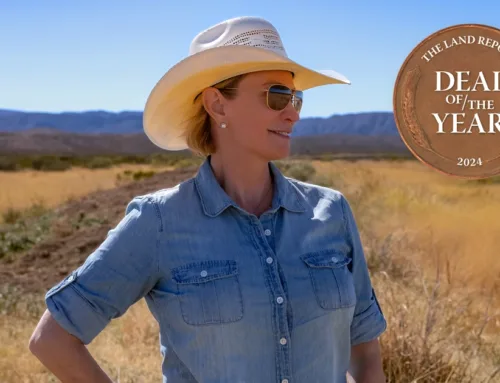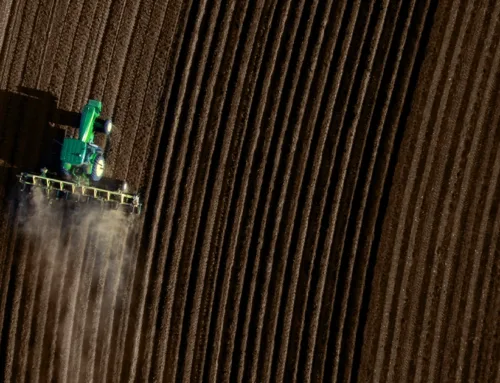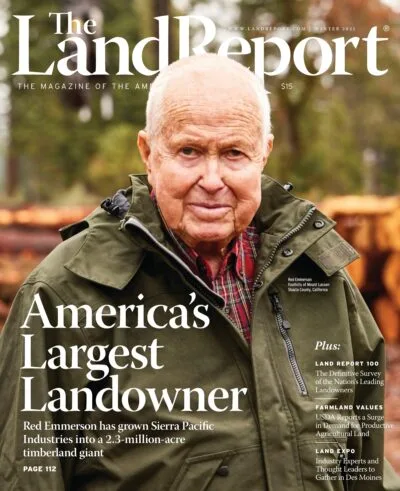Is AcreTrader the Future of Farming?
Is AcreTrader the Future of Farming?
By Bill Briggs
Photography By Gustav Schmiege III
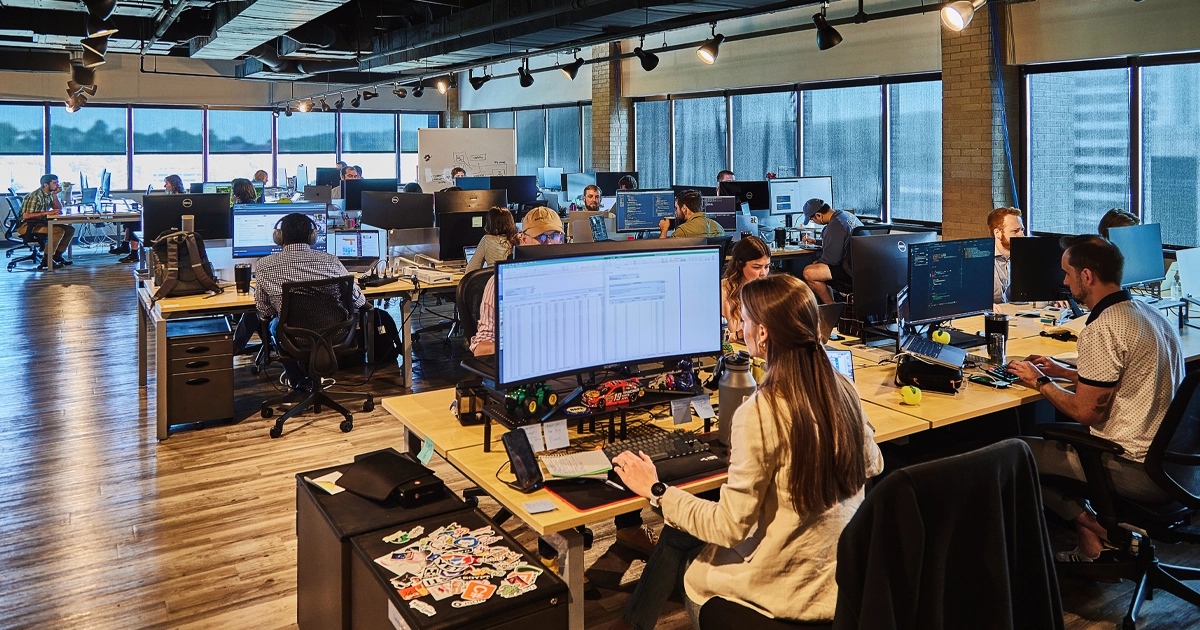
LR_AcreTrader-01
In a cluster of offices in Northwest Arkansas, AcreTrader has built a groundbreaking method for investors and farmers to buy and sell cropland.
In 2018, Carter Malloy came home to Arkansas to launch a new kind of matchmaking service. It was inspired by the love of his life.
Malloy’s idea was novel yet simple: Connect investors wanting to buy farmland with farmers seeking to sell their acres and grow their businesses — a sort of real estate harmony across American cropland. His brainstorm begat AcreTrader, which helps investors research, find, and purchase shares of farmland in minutes — a concept that Barron’s has described as “a Charles Schwab of acreage.”
“We’re seeing lots of investors come into the space — and a lot of interest (among) new investors taking a look,” Malloy told Bloomberg TV during a recent interview. “For some perspective, we’ve seen $30 or $40 billion … of institutional capital active in the space today; included in that (is) our platform at AcreTrader.
“These investors may be buying thousands, tens of thousands, or … a few hundred thousand acres of farmland. There are hundreds of millions of acres of farmland just here in the US. Generally, we see investors often partnering with farmers, as we do at AcreTrader,” Malloy said.
The AcreTrader Story
With nearly 150 employees in three offices in Fayetteville, AcreTrader aims to improve the financial well-being of farmers and investors alike. By supplying customers with groundbreaking data and market expertise, the AcreTrader founder and CEO says he’s making the buying and selling of farmland easier and more transparent while elevating agricultural fields into a mainstream asset class.
The concept is rooted in the surging appeal of investment-worthy cropland, acres with healthy soils and historically rich harvests — or the potential to attain those attributes with a bit of help. AcreTrader’s supply-side customer is typically a farmer who wants to grow their operation but needs a monetary infusion to buy more machinery or maybe more land, Malloy says.
“As a business, that allows us to scale more quickly, because we’ve got these third-party partners out there actively looking for land they want to farm,” Malloy says. “And there’s an implied endorsement by that farmer that this is good ground. They know those local areas very, very well.”
Ultimately, Malloy and his team want third-party brokers and farmers to view AcreTrader as a go-to partner. During media interviews, they are eager to underscore that their company is not and never will be a faceless enterprise only pursuing land deals or market domination. It’s about people.
“Our goal is: How do we help more transactions happen? How are we becoming a facilitator of transactions rather than just purely a buyer of land?” says Garrott McClintock, AcreTrader’s chief operating officer, who grew up on his family’s fifth-generation farm in the Mississippi Delta.
“What we’re really trying to do is connect people in rural areas who need to expand their business with investors looking for investment opportunities in land,” McClintock adds. “Recently, we were talking to some other land investors who said, ‘We don’t look at you as competition. We look at you as a friendly market participant.’
“That’s exactly what we’re going for: How do we bring more people into this industry and make it more vibrant and more active for everyone?”
Sure, the entrepreneurial-minded team at AcreTrader envisions their business emerging as the default platform for land transactions — an ambitious outlook. But for Malloy, 40, who was raised in an Arkansas rice-farming family, it goes so much deeper. A palpable romanticism spurs his work. It’s fueled by his “love affair with land.”
“Growing up, being out in the country early in life, I sensed that this is my place. This is where I belong. I’m just in love with land,” Malloy says. “As a teenager, I realized that all our plants — the grandeur and scale with which we’re producing food for the people — was pretty amazing.
“Later, as my career progressed, I began to recognize that not only is this a place that I love, this place where we grow food, but that land is also a fascinating asset class,” he adds. “The potential for investment in land is really attractive.”
Farmland Values
His timing couldn’t have been better. Over the past few years, the American farmland market has been hotter than a pepper sprout. According to the US Department of Agriculture’s 2022 Land Values Summary, which was released in August, the average value of cropland per acre reached $5,050 this year, a 14.3 percent increase from 2021.
Over at Farmers National Company, the nation’s largest farm management firm, the dollar volume of the company’s 2022 farmland auction sales rose by 75 percent year over year.
As an asset class, the value of US farmland is broadly appraised at $3 trillion. AcreTrader estimates that about $100 billion worth of US farmland trades annually.
Where’s this trend going? Upward, says Malloy. The planet’s steadily growing population is driving a mounting need for food — a need heightened by Russia’s invasion of Ukraine. Meanwhile, the amount of farmland acreage is decreasing in the US. Since 2014, the amount of farm acreage nationwide has plummeted by more than 13 million acres.
At the same time, many experts recognize farmland as an excellent inflation hedge, offering low volatility compared to stocks or commercial real estate while providing attractive investment yields with long-term returns. If you had invested $10,000 in farmland in 1991, it would be worth more than $215,800 today, according to the NYU Stern School of Business.
“It’s been fascinating to see over long periods of time farmland has shown pretty intense correlation with inflation,” Malloy told Bloomberg TV in September. “It makes a lot of sense. We grow food, fuel, and fiber on farmland. So we have seen some rising farmland prices alongside inflation here recently.”
That trend, along with other attractive economic dynamics, has enticed deep-pocketed investors such as Land Report 100ers Bill Gates and Stewart and Lynda Resnick to go long on farmland. That’s no surprise to Malloy.
“When we see outside investors coming into farmland, I think often they see the same thing that we do, which is they’re after slow and steady compounding of capital, preservation of wealth, and diversification of their holdings,” he told Bloomberg TV.
Indeed, for someone who cherishes a sense of place, Malloy seems to be in an exceptional spot from a business perspective, and he’s arrived there at an ideal moment with a better mousetrap. He’s also built a thriving team. AcreTrader’s staff includes software engineers, land specialists, and data scientists, many of whom grew up on farms or ranches.
“First and foremost, we describe ourselves as farmers. We live in this weird Venn diagram of technology, finance, and agriculture,” Malloy says. “And finding the unique people who fit in the middle of those three buckets is pretty hard. I work with a bunch of brilliant folks every day.”
AcreTrader works with landowners to determine the best farmland parcels to list on its investing platform. Each farm, along with its title, is placed in its own legal entity and divided into shares that are sold through the company’s secure portal.
Since its start, AcreTrader has hosted thousands of investors from all 50 states, which has enabled the company to manage the acquisition and leasing of cropland and orchards across the US.
It has managed the sale of farms in 17 states as well as Australia, totaling hundreds of millions of dollars of land.
In May 2022, the 100th such property passed through the firm’s investing platform – Prairie Green Farm, a corn and soybean operation in Northeastern Illinois.
Like many properties on the AcreTrader site, Prairie Green is situated in a rural but agriculturally vital area. After the sale, the property was leased back to the local farmer, a tenant who’s been on the land for years. The farmer longed to stay there. AcreTrader helped him adapt his lease, creating a positive outcome for both the farmer and the investors.
The company typically works with farms valued at between $1 million and $10 million. Its diverse blend of investors ranges from celebrities to family-business owners to more traditional institutional players.
For most investors, cracking into the farmland market carries thorny challenges. Traditionally, investors have relied heavily on their financial advisers to help evaluate unfamiliar rural assets — but rarely have the advisers or the investors possessed much real farming savvy.
What’s truly kept most investors from considering farmland, however, is the massive upfront capital needed to purchase an entire farm, plus the associated costs of managing people to run the operation.
Malloy has stripped away those obstacles by dividing the farm entities into shares equivalent to one-tenth of an acre and by ensuring that AcreTrader handles administration and property management, from insurance to accounting to improving soil sustainability.
Now, rather than having to put down $1 million or $2 million to buy and manage an entire farm, accredited investors can pay $10,000 or $100,000 or other amounts, receive access to the AcreTrader platform, and purchase an interest in a specific farm.
Investors earn money two ways: via cash rent payments made by tenant farmers and through appreciation in land value over time.
“I dug into securities laws and hired some attorneys to offer this fractionalized product,” Malloy says. “We are getting more people involved in agriculture and more people involved in rural America.”
That customer base also includes long-established farmers who leverage AcreTrader to make big business moves such as expanding their acreage, transitioning to organic, creating more friendly lease situations, or simply raising additional capital.
If, for example, a tenant farmer is renting a property that’s listed for sale, AcreTrader can purchase the farm, enabling that farmer to continue tending those same acres. In other cases, the company works with farmers to retain partial ownership of their own farm while offering the balance of the property to investors on its platform.
Sometimes a farmer will identify a property they’re interested in managing, such as a profitable soybean parcel down the road. AcreTrader works as the buyer and establishes a multiyear lease for them on that new land.
“Or maybe a farmer wants to buy more land, but they don’t have enough cash to buy the whole tract,” McClintock says.
“Maybe they’ve got a hundred grand to spend, but it’s a $3 million farm. They can come in alongside our investors, invest in that property, and farm it. They wouldn’t have been able to do either of those things before,” McClintock says.
In recent months, AcreTrader has funded a vineyard in Santa Barbara County, California; a Minnesota farm that grows corn, soybeans, and wheat; and a Washington farm that raises corn, potatoes, and grass seed, just to name a few.
In September, AcreTrader announced the disposition of a 160-acre soybean and rice farm in Northwestern Mississippi, about an hour south of Memphis, Tennessee. After purchasing the farm, AcreTrader added irrigation wells and leveled the land to help offset extreme weather conditions. Selling the property resulted in a preliminary annualized internal rate of return of 13.7 percent, exceeding the projected target return of 8.3 percent.
Location, Location, Location
The company continues to follow the oldest real estate maxim: location, location, location. By opening the business in Fayetteville, Malloy and his team are a half-day’s drive to farms in the Midwest and the Mississippi Delta. Meanwhile, Malloy’s family farm is situated near Stuttgart, Arkansas, which is famous for its rice fields and duck hunting. Malloy himself graduated from the University of Arkansas, also based in Fayetteville.
All those roots, he acknowledges, help solidify the firm’s solid footing with farmers and rural landowners. City slickers they are not.
“We have people who come into the office and track mud on their boots,” Malloy says.
“Being close to the customer is always an important part of any business. In our case, our customers – our partners – are farmers, and a lot of them are in the middle of America,” he adds. “If we were calling from San Francisco or Wall Street, they wouldn’t take our call.”
And while AcreTrader leans hard on data science, having built its platform with cloud computing, machine learning, and visual computing, Malloy is always careful to say that he and his team are in a relationship business that puts a premium on a handshake, not a hard drive. Many land trades still involve phone calls and flyers.
“What matters is: How does this technology help me as a business? So, yes, we do use just damn near everything available out there in terms of modern data lakes and intense analytics,” Malloy says. “But really, it boils down to making sure we remain empathetic to our market and our customers in order to help them achieve their goals.
“Technology will never replace relationships. Technology will not buy and sell land,” he says.
That’s some down-home wisdom from a Millennial raised during the Information Age. Then again, just talk to Malloy’s best friend — his stepfather, Jay McEntire — and you’ll hear that same ideology. The two chat every day. They’ve bought and sold land together. For decades, Jay has tried to imbue Malloy with a deep adoration of land.
“It’s been a great journey,” McEntire says, “for him and for me.”
McEntire enjoys telling two family tales about his stepson. One involves a farmhand who worked in McEntire’s fields. When Carter was a teenager, the hand told McEntire that, “Carter’s got the whole package.” That compliment turned into an often-repeated line that the family has enjoyed throwing at Malloy over the years.
The other story involved the day Malloy’s high school principal summoned him into her office. She somberly told Malloy that he wasn’t going to graduate. Malloy couldn’t understand why. He had earned A’s in every class, he told her. Problem was, the principal explained, he so rarely attended those classes.
“He just was bored, and he had other pursuits,” McEntire recalls with a laugh. “In the end, they did let him graduate. He was 16 years old.”
Diploma in hand, Malloy enrolled at the University of Arkansas at 16, majoring in physics. Following college, he owned small businesses focused on Internet marketing and sustainable fuels technology, then worked for seven years as an equity research analyst at Stephens Inc., a privately held financial services company based in Little Rock.
In 2013, Malloy headed west, spending five years as part of the founding team of a global equity firm in the San Francisco Bay Area. Then in 2018, he returned home to devote himself to that first love.
His stepdad smiles at the full circle of the pilgrimage that’s led Malloy back to the soil.
“You know, in our society, everybody’s in a hurry,” McEntire says. “Population is shifting back and forth. Just seems like people don’t have that sense of place anymore. That’s what I’ve been trying to instill in Carter. It’s become his passion. And now, it’s carried over to his business.”
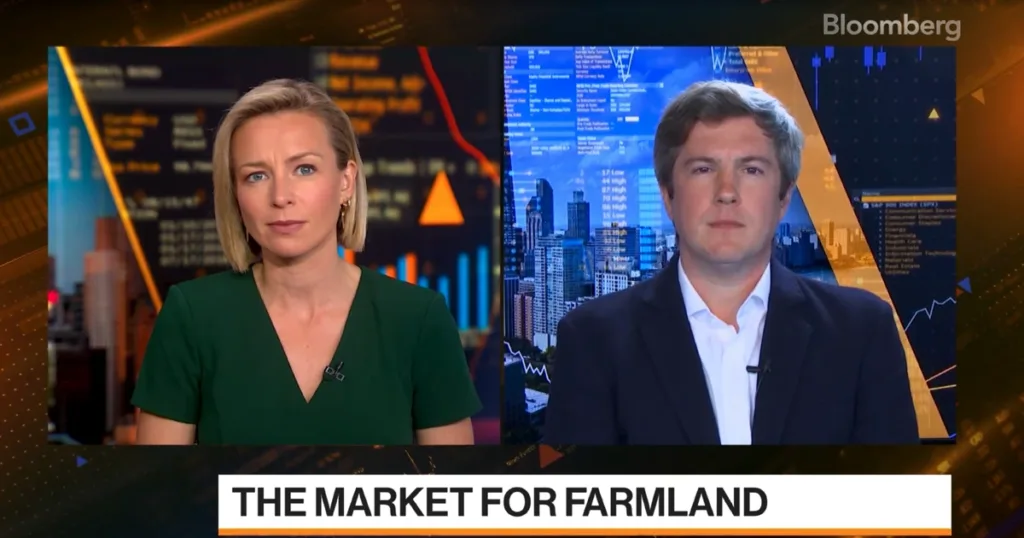
During an appearance on Bloomberg News, Malloy (right) noted that AcreTrader’s strategy of partnering with farmers is a natural extension of industrywide practices already in place.
Originally published in The Land Report Fall 2022.


